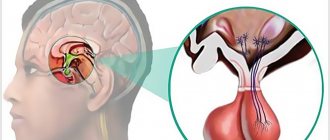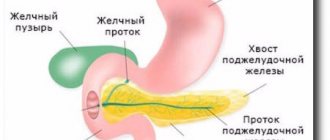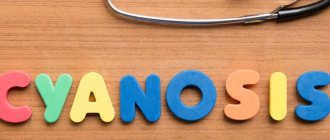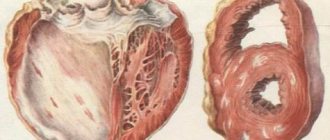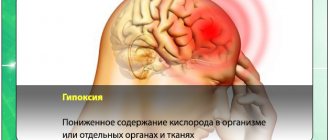Memory is not just a set of information, but a complex function that affects a person’s feelings and behavior. Memories form the personality, so when they are lost or distorted, not only the ability to interact with the outside world suffers, but also the mental balance and unity of the personality.
Changes in memory and thinking are a natural part of aging. But when, regardless of age, there is significant memory degradation and the ability to form new memories is lost, it is worth learning more about what amnesia is.
Amnesia is a symptom in which there is a dysfunction of memory with partial or complete loss. In most cases, people are correctly oriented to their own personality and retain motor skills. The main difficulty lies in learning and processing new things. Impaired memories of the past also occur, but old and vivid events are retained better than new information. Amnesia can be a short-term condition that lasts no more than a few minutes or hours, but in some diseases, memory problems continue for years and gradually get worse.
Regarding amnesia, what it is will be better understood by understanding how memory works. It includes many complex brain processes, which are based on the flow of information into neurons in the form of electrical impulses. Processing this information includes the following steps:
- Registration - receiving and perceiving something new
- Coding and storage - processing material, forming associations, associations, accumulating and storing information. This provides a basis for learning and thinking.
- Reproduction is the application of past experience. One of the simplest forms is recognition—comparing an object with its image.
Amnesia occurs when any of these stages are disrupted. It may seem that attention, thinking, intelligence or speech are suffering, but in fact, the primary problem is memory impairment. If you suspect that you or a loved one have amnesia, your doctor will tell you what it is and the reason. This condition is a symptom that accompanies an underlying somatic or mental pathology, so appropriate treatment is necessary.
What is amnesia?
Memory loss with disruption of connections between neurons is called amnesia. The diagnosis is determined after a thorough examination of mental functions. During the conversation and observation of behavior, a quantitative violation of the memorization and reproduction of known information is revealed. Replacing missing time periods with fictitious facts is called false memories.
After prescribing additional research methods (computed tomography, magnetic resonance imaging, encephalography, ultrasound, Dopplerography), it is possible to detect organic processes that lead to memory impairment.
A person with amnesia suffers from the inability to recall experiences, which disrupts his emotional status and thought process.
Characteristic manifestations
Let's see what the signs of amnesia are:
- difficulties in remembering events that happened in the recent past;
- the formation of false memories, fictitious events in order to fill gaps in memory;
- a complete lack of memory about one’s life, oneself, or occupation;
- disturbance of orientation in time and space;
- constant forgetfulness, decreased concentration.
What causes memory lapses?
The causes of amnesia are clarified after collecting anamnesis, examining mental functions, neurological status, and instrumental examination. Sudden memory loss may be a consequence of serious diseases of the nervous system of organic or functional origin that require treatment.
Loss of memory for a specific period of time in young people develops against the background of traumatic brain injury or severe stress. A severe disorder associated with memorizing and reproducing new information is restored provided that the brain neurons are preserved.
Signs of amnesia should not be ignored, even if the forgotten points are of no practical significance.
Organic causes
Processes that are accompanied by the death of neurons and cause memory gaps require therapeutic measures with rehabilitation:
- traumatic brain injuries with destruction (bruises, intracranial hematomas);
- vascular pathology (previous ischemic or hemorrhagic strokes, hypertensive encephalopathy);
- volumetric processes in the cranial cavity (tumors, parasitic cysts, cystic formations);
- infectious lesions of the membranes or brain (meningitis, encephalitis);
- epilepsy;
- encephalopathy due to abuse of alcohol or other toxic substances;
- overdose of tranquilizers and sleeping pills;
- senile dementia (Alzheimer's disease, Pick's disease, progressive atherosclerosis);
- migraine;
- schizophrenia.
Strict diets that limit nutrients and important vitamins and minerals can cause memory loss.
Psychogenic causes
Strong psychotraumatic factors (death of relatives, natural disasters, military operations) are often accompanied by amnesia. The symptom can develop at any age, it protects the nervous system from excessive stress.
Interesting: Memory restoration after loss due to alcohol intoxication
Patients with a hysterical personality are prone to such symptoms and selectively forget unpleasant facts (humiliation, physical or sexual violence). Those moments that are not accompanied by difficult memories are stored in long-term memory and can be recalled.
Psychogenic causes do not cause the death of neurons, but the connections between them that are responsible for the transmission and extraction of information are disrupted.
Definition
Amnesia is (in psychology the definition of the pathology of human consciousness) manifested by memory disorders and loss of memories of the circumstances of one’s life in different periods of time.
Violations are psychological in nature, manifest themselves during wars, natural disasters, the loss of a loved one, and can be the result of unhappy love. In psychology, amnesia is not caused by organic pathologies of the central nervous system; the disease develops as a result of experienced emotional suffering, which activates the protective mechanism of consciousness - the loss of negative memories. The disease often has the character of a dissociative disorder: a person subconsciously denies a fait accompli, his brain displaces unbearable experiences from consciousness.
Multiple Sclerosis - What is this Disease?
Types of amnesia
Depending on what events are erased from memory, the following pathology options are distinguished:
- retrograde;
- anterograde;
- retroanterograde;
- fixation.
Complete amnesia covers all stages of life; such lesions are unfavorable in prognostic terms and occur in severe organic lesions of the brain.
A peculiar version of a gap in memories is childhood amnesia . This phenomenon is explained by physiological reasons (immature brain) and is normal . This amnesia extends to the first 2-3 years of life. The events of this time do not fall into the cells of long-term memory, so there are no memories of this period.
The following variations of amnesia are determined by the nature of the course:
- stable;
- progressive;
- regressing.
The most favorable prognosis is for the regressing form.
Retrograde amnesia
The symptom extends to the period of time preceding the disease or head injury. This condition is often the result of traumatic brain damage.
Amnesia can cover a short period of several hours, but there are situations when the victim forgets large stages of life, even facts from his biography. During recovery, events that happened a long time ago are first remembered, and then those that immediately preceded the injury.
Antegrade amnesia
Anterograde amnesia is accompanied by loss of memory for what happens after an illness. This symptom occurs when there is a disruption in the transfer of information to long-term memory cells. Characteristic of toxic brain damage, for example, with an overdose of tranquilizers or sleeping pills.
Fixation amnesia
Accompanied by a violation of recording current events. It is difficult for the patient to remember what he did five minutes ago, but he remembers perfectly what happened to him before. Occurs at the terminal stage of alcohol dependence (Korsakov's psychosis), with encephalopathy due to substance abuse. False memories arise to replace failures.
Problems with recording current events are often combined with other forms of amnesia, which is characteristic of Alzheimer's disease.
Progressive increasing amnesia
This form of disorder is characterized by a gradual increase in symptoms; the patient does not perceive new information, but old memories also become chaotic. Progressive amnesia obeys Ribot's law: information about recent events is initially lost, and then the earliest period of life disappears.
Interesting: Short-term memory impairment: causes, consequences and treatment
Regressive amnesia
Regression of pathological symptoms associated with memory gaps occurs with a concussion, a condition after general anesthesia. Regressive amnesia is a consequence of hypoxia of nerve cells; earlier events are first restored in memory, and then the most recent memories return.
general description
In psychiatric practice, amnesia is understood as an extreme form of memory disorder, expressed in its complete absence.
Memory disorders that exist over a long period of time lead to the formation of psychoorganic syndrome and dementia. The most common cause of short-term memory loss is stroke, and the least common is an unbalanced diet. The causes of amnesia are associated with the impact of damaging factors on the brain structures, or psychological disorders. Among them:
- stroke;
- brain injuries;
- chronic alcohol intoxication;
- intoxication with certain medications;
- psycho-emotional trauma;
- epilepsy;
- migraine attacks;
- transient cerebral circulatory disorders;
- cerebral atherosclerosis;
- Alzheimer's disease;
- brain tumors;
- somatic pathology occurring with attacks of suffocation;
- unbalanced diet.
What diseases and conditions cause memory loss?
The prognosis depends on the disease that caused the memory loss. Accurate diagnosis makes it possible to understand the cause of the disruption of interneuron connections and work with the main problem.
The most common cause of problems with memory and reproduction is head trauma, especially to the temporal and frontal parts. A more favorable prognosis for a concussion, since neurons suffer from hypoxia, but continue to work. Problems after anesthesia and stressful conditions can be successfully corrected after the prescription of medications and psychotherapy.
Amnestic manifestations in children and young people give hope for positive dynamics due to the plasticity of nervous processes and the rapid formation of new interneuron connections.
After anesthesia
The general anesthesia required for surgery can cause memory impairment. Short-term retrograde amnesia is common, which extends to the period of time preceding the operation. Later, an anterograde type disorder with impaired short-term memory may develop. Symptoms disappear after a few days, and amnestic failure may rarely occur within a year after surgery.
Patients often suffer from the disorder during cardiac surgery and brain surgery.
Under stress
A stress factor can cause short-term memory loss. A person cannot remember his recent actions (where he put his keys or why he ended up in a particular place).
Severe emotional shocks can cause erasure of the most unpleasant events that led to psychological trauma. Under hypnotic influence, memories are restored, and in the waking state they are again erased from memory. Disorders with forgetting of certain information are more common when the first signaling system is dominant and there is a tendency to hysterical reactions.
For stroke
Impaired cerebral circulation with the formation of areas of necrosis can cause amnesia. A disorder of remembering dates, names, numbers or non-verbal (faces, music, impressions) images develops. The extent and severity of symptoms depends on the size and location of the stroke. Recovery is carried out due to the activation of neurons adjacent to the affected area and depends on the plasticity of neural processes.
For headaches
Severe headaches during a migraine attack with aura may cause short-term memory loss for events that immediately preceded or occurred during the attack.
When intoxicated
Alcohol intoxication provokes short-term memory disorder. Events associated with intoxication may be completely forgotten. This phenomenon is especially pronounced during pathological intoxication, when even small doses of alcohol provoke amnesia for periods of time.
Interesting: Causes, treatment and symptoms of dissociated amnesia
Chronic alcoholism causes the development of Korsakov's psychosis, in which the patient loses the ability to remember current events that happened to him at a given point in time (fixation amnesia).
For epilepsy
After an epileptic seizure, amnesia for events associated with the seizure usually develops. The disease is accompanied by the periodic occurrence of a twilight disorder of consciousness, when the patient performs actions that he then cannot remember anything about.
After TBI or SHM
Traumatic brain injury causes the development of retrograde amnesia. Severe damage causes persistent and long-term memory impairment. A concussion is accompanied by short-term amnesia, the symptom quickly regresses.
More severe disorders occur with anterograde amnesia. Memory gaps that occur several hours or days after injury indicate the development of an intracranial hematoma.
In hypertensive crisis
A sudden and significant increase in blood pressure can cause cerebral edema with neurological deficits. After the condition improves, amnesia of recent events may develop while basic memories are preserved. New attacks against the background of hypertensive encephalopathy deepen impairments in memorizing and reproducing information.
Symptoms of pathology
Symptoms of amnesia manifest themselves in the patient’s loss of the ability to recall certain events in his life. As the body ages, a gradual decline in memory function is a normal physiological phenomenon. But sudden memory loss is a reason to worry and undergo a full examination.
Amnesia is manifested by the following symptoms:
- Memory loss, in whole or in part.
- Impaired awareness of the surrounding world.
- Severe headaches.
- Disorientation in space.
- A person’s inability to remember someone’s faces or remember an event.
- Feeling of anxiety, development of depression.
Memory loss does not affect the performance of a person’s functions in society, but it changes his standard life pattern. The patient temporarily loses his ability to work, finds it difficult to navigate in society, and has an inadequate reaction to others. A person begins to replace missing memories with false facts. This leads to confusion in the mind.
If memory loss is the result of an injury, the patient will experience accompanying symptoms in the form of: headache, dizziness, decreased quality of vision, increased sensitivity to sounds and light. The patient may experience sleep disturbances, sleepwalking, and depression.
Diagnostics
The diagnosis is clarified after an examination by a psychiatrist, who reveals the absence of memories for a time period and the ability to remember current events . Consultations in psychiatry help determine the presence of mental disorders .
Identification of a large group of organic diseases is possible after prescribing the following additional examinations:
- EEG;
- CT scan;
- Magnetic resonance imaging;
- dopplerography;
- angiography.
In diagnosing amnesia, careful collection of anamnesis of the disease and life is of great importance.
Treatment of amnesia
An arsenal of drugs is used to treat amnestic disorders:
- nootropics (Piracetam, Nootropil, Pramiracetam, Memoplant, Tanakan);
- vascular drugs (Cavinton, Trental, Vinpocetine);
- peptides from animal brain tissue and blood hydrolysates (Cerebrolysin, Cortexin, Actovegin, Semax, Cerebrocurin);
- antidementia drugs (Memantine, Gliatilin);
- antihypoxic agents (Mexidol, Succinic acid, Cogitum).
Amnesia due to stress requires the prescription of sedatives and psychological assistance . Psychotherapy and psychoanalysis sessions improve the condition and help the patient return to everyday life.
Recommendations
- Consultation with a neurologist.
- Consultation with a psychiatrist.
- Consultation with a narcologist.
Essential drugs
There are contraindications. Specialist consultation is required.
- Piracetam (nootropic drug). Dosage regimen: orally, at a dose of 2-4 g/day. for 3 doses.
- Gliatilin (neuroprotective agent). Dosage regimen: orally, at a dose of 400-800 mg 3 times a day.
- Pyritinol (a drug that improves cerebral circulation). Dosage regimen: orally, at a dose of 300-600 mg/day. for 2-3 doses.
- Cerebrolysin (nootropic drug). Dosage regimen: IV, by slow infusion at a dose of 10-20 ml 1 time/day.
Prevention of amnesia
To prevent amnestic memory gaps, it is necessary to take measures to prevent brain injury and poisoning with neurotoxic drugs. Measures to prevent cerebral strokes include:
- blood pressure control;
- taking medications to reduce blood viscosity (aspirin in small doses);
- rejection of bad habits;
- daily routine with alternating mental, physical activity and rest.
To prevent senile dementia, control of cholesterol and triglycerides is necessary. Dementia of the Alzheimer's type, associated with the accumulation of amyloid and tau protein in the brain tissue, requires early administration of Memantine.
Amnesia is a serious symptom indicating disorganization of brain structures. Diagnosis of the conditions that led to memory impairment makes it possible to restore the affected mental functions. After determining the nature of the disorder, are determined .
Interesting Facts
97% of healthy people have experienced at least once in their lives unusual experiences associated with memory deceptions; in patients with epilepsy, these phenomena are more common, but to this day they remain poorly understood.
The meaning of well-known expressions related to memory features is as follows:
- déjà vu – already seen;
- déjà vécu – already experienced;
- déjà entendu – already heard;
- déjà baisée – already tried;
- jamais vu - never seen.
